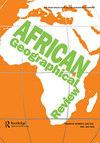Regional resilience and social-ecological systems: the impact of COVID-19 on community conservation in Namibia
IF 1.1
Q3 GEOGRAPHY
引用次数: 0
Abstract
ABSTRACTThe COVID-19 pandemic severely affected wildlife areas in Namibia, where the collapse of tourism threatened community-based natural resource management programs. This study conceptualizes community conservancies as social-ecological systems and links this framework to an evolutionary regional resilience perspective. Qualitative interviews reveal the vulnerability of conservancies in the Zambezi region due to their heavy reliance on tourism revenues. While adaptation processes and donor support have mitigated negative impacts, the prioritisation of conservation over rural development risks undermining the long-term adaptive capacity of the region. Continued donor support, policy improvements and diversification efforts are essential to strengthen the resilience of community-based conservation.KEYWORDS: CBNRMregional resiliencesocial-ecological systemsCovid-19Namibia AcknowledgmentsWe would like to thank Carolin Hulke, Jim Kairu, Javier Revilla Diez and Lucas Rutina who, together with Linus Kalvelage, designed and organised the first wave of data collection as described in Hulke et al. (Citation2022). Data collection would not have been possible without the help of the following University of Namibia graduates: Sofia Nifuma, Simasiku Adrein Mwanangombe, Chataa Aretha and Pauline Munyindei. We are also grateful for the support of Castrow Muunda, Chairperson of the Zambezi Horticulture Producers Association. We are particularly indebted to all the respondents who shared their knowledge and time to contribute to this study. The German Research Foundation (DFG) funded this study through the Collaborative Research Centre (CRC/TRR 228/1) 'Future Rural Africa'.Disclosure statementNo potential conflict of interest was reported by the author(s).Additional informationNotes on contributorsLars LüderLars Lüder is a human geographer with a focus on human-environment relations and is currently enrolled in a Master of Science in Geography at the University of Cologne. He previously studied Geography and African Languages and Cultures at the same university.Linus KalvelageLinus Kalvelage is a postdoctoral researcher and lecturer at the Institute of Geography, University of Cologne, Germany, and a member of the inter-disciplinary Global South Studies Center. With a focus on economic geography, Linus works at the interface of economy, nature and space, analyzing regional development trajectories through nature conservation and energy transition in peripheral regions. His doctoral research within the Collaborative Research Centre (CRC 228) ‘Future Rural Africa’ looked at the intersection of growth corridors, tourism value chains and protected areas in Southern Africa. His postdoctoral research is concerned with sustainable energy transitions, in particular green hydrogen projects in the European and African periphery.区域复原力和社会生态系统:COVID-19对纳米比亚社区保护的影响
COVID-19大流行严重影响了纳米比亚的野生动植物区,旅游业的崩溃威胁到以社区为基础的自然资源管理计划。本研究将社区保护概念化为社会生态系统,并将这一框架与进化的区域恢复力观点联系起来。定性访谈揭示了赞比西地区保护区的脆弱性,因为他们严重依赖旅游收入。虽然适应过程和捐助者的支持减轻了负面影响,但将保护置于农村发展之上的做法可能会破坏该地区的长期适应能力。捐助者的持续支持、政策的改进和多样化努力对于加强以社区为基础的保护的复原力至关重要。我们要感谢Carolin Hulke, Jim Kairu, Javier Revilla Diez和Lucas Rutina,他们与Linus Kalvelage一起设计并组织了Hulke等人(Citation2022)中描述的第一波数据收集。如果没有以下纳米比亚大学毕业生的帮助,数据收集是不可能的:Sofia Nifuma、Simasiku Adrein Mwanangombe、Chataa Aretha和Pauline Munyindei。我们也感谢赞比西园艺生产者协会主席Castrow Muunda的支持。我们特别感谢所有分享他们的知识和时间为这项研究做出贡献的受访者。德国研究基金会(DFG)通过合作研究中心(CRC/TRR 228/1)资助了这项研究。“未来非洲农村”。披露声明作者未报告潜在的利益冲突。作者简介:lars lderlars l是一位专注于人类与环境关系的人文地理学家,目前正在科隆大学攻读地理学硕士学位。他之前在同一所大学学习地理和非洲语言文化。Linus Kalvelage,德国科隆大学地理研究所博士后研究员、讲师,跨学科全球南方研究中心成员。Linus专注于经济地理学,研究经济、自然和空间的界面,通过周边地区的自然保护和能源转换来分析区域发展轨迹。他在合作研究中心(CRC 228)的博士研究“未来非洲农村”研究了南部非洲增长走廊、旅游价值链和保护区的交集。他的博士后研究方向是可持续能源转型,特别是欧洲和非洲周边的绿色氢项目。
本文章由计算机程序翻译,如有差异,请以英文原文为准。
求助全文
约1分钟内获得全文
求助全文

 求助内容:
求助内容: 应助结果提醒方式:
应助结果提醒方式:


